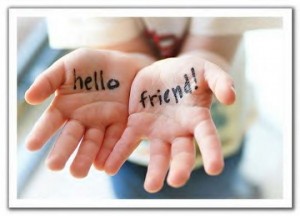 My average day is completely filled with people. From the moment I wake up, I’m constantly reading peoples’ opinions, emailing, messaging, chatting, tweeting, meeting, skyping, and texting. All told, my social network (physical and digital) spans about 30,000 people.
My average day is completely filled with people. From the moment I wake up, I’m constantly reading peoples’ opinions, emailing, messaging, chatting, tweeting, meeting, skyping, and texting. All told, my social network (physical and digital) spans about 30,000 people.
I’ve come to realize that connections, acquaintances, and friendships serve fundamentally different functions and require radically different approaches. In fact, I believe you can only have 20 real friends in your life.
All relationships start as a connection. You met somewhere, digitally or otherwise. This phase of the relationship is about context and awareness. Who is this person? What are her values? What bucket do I put him in? We really like to get past this phase quickly because it’s extremely awkward, and most connections are wasteful (i.e., don’t lead to anything meaningful). We try desperately to take shortcuts by running through a litany of possible shared experiences that would allow us to categorize the relationship. School? Hometown? Job? Accomplishments? Shared relationships? Without commonalities, it’s almost impossible for the relationship to progress.
Once a commonality is found, the relationship can progress to the acquaintance phase. This is where almost all of our “friendships” reside. We organize acquaintances into categories based on the type of value they add. My categories include business, church, family, travel, hometown, and certain special categories of interest, like golf, wine, and entrepreneurship. By the time people make it into these categories, I generally know who they are and what they do. I have interacted with them, usually more than once. I have a general trust and respect for them. I would help them (to a degree) if asked. I appreciate them for the value they add to my life. I don’t go out of my way to interact with them. I don’t feel responsibility for their happiness. I don’t usually have conflict with them. I generally enjoy our interactions.
Does this sound cold and sterile? It probably does, because most of our relationships are exactly that. They are based on limited interactions and a specific type of value. That doesn’t make them worthless or unattractive. They just are what they are. We have a limited amount of resources (most importantly, time) to invest, and we must choose wisely to get the largest return on that investment (and I’m not speaking economically).
True friendship is strange, difficult, and deeply rewarding. In some ways, it’s indescribable. Many poets and people far smarter than me have written volumes on the subject. All I can do is provide some context to describe a true friendship.
A friend understands you, including your faults, beliefs, prejudices, aspirations, and frustrations. A friendship is dynamic and ever-evolving. It molds to both friends’ needs. It supports both your lives. A friend helps you maintain your principles, never asking you to bend or break them. A true friend inspires and encourages you to live up to your potential. A friend speaks truth into your life, which is sometimes hard truth. It’s said that “good advice grates on the ear,” but a friend won’t resist. Ultimately, friendship is a mutual agreement to take partial responsibility for the happiness in each other’s lives. This unspoken contract provides a bond and sense of fulfillment that cannot be achieved any other way.
How many people fit that definition in your life? The number likely hovers under 10, and it definitely includes fewer than 20. I arrive at those numbers based on the sheer amount of resources required to maintain a friendship. It’s incredibly hard – and incredibly rewarding.
By understanding how we should truly classify our relationships, we can become far more productive and effective socially, emotionally, and economically.
Brent Beshore is the CEO of AdVentures , ranked #28 on the 2011 Inc. 500 list of the fastest growing companies in the U.S.



